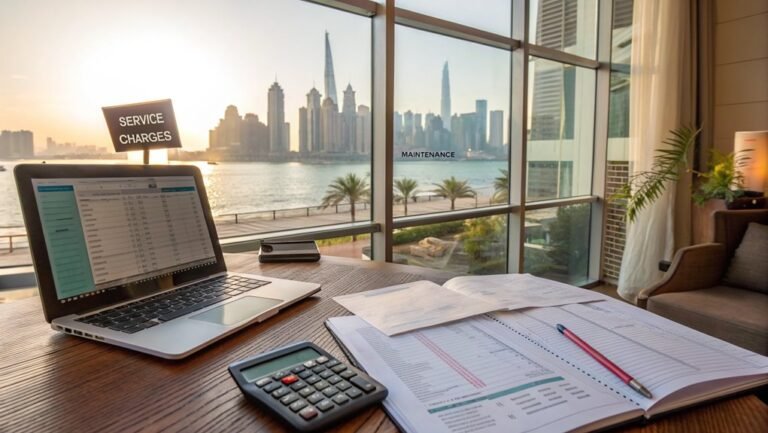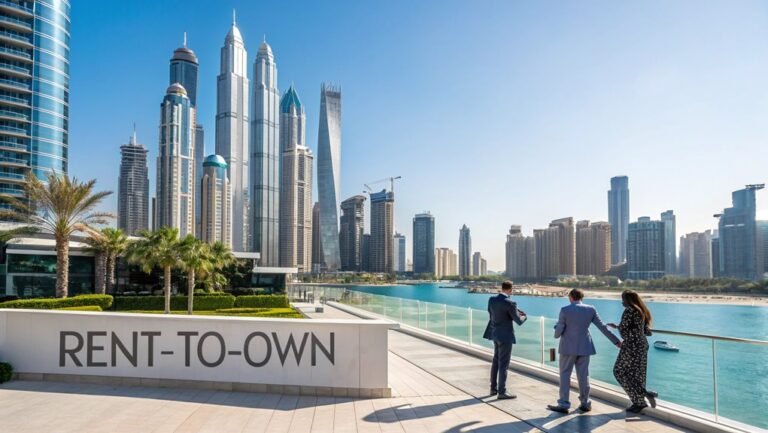Understanding Rental Contracts and Legal Requirements

When stepping into a rental agreement in Dubai, it's crucial to understand the contract and legal requirements. This isn't just about knowing the rent amount; it's about understanding your responsibilities and rights. What if you need to break the lease early? How are security deposits handled?
Dubai rental laws offer specific protections for tenants. Knowing these specifics can save you from unexpected pitfalls. For example, the Dubai Land Department (DLD) and the Real Estate Regulatory Agency (RERA) set guidelines that protect tenant rights.
Security deposits in Dubai are typically one month's rent and should be refunded at lease end if no damages occur.
Familiarize yourself with the rental contract’s terms and conditions. Always get agreements in writing to avoid misunderstandings. One key aspect to be aware of is understanding rental yield calculation. This will help you determine the potential return on your investment and make informed decisions about the property. It’s also important to thoroughly inspect the property before signing anything and to address any maintenance or repairs that may be needed. By staying informed and proactive, you can ensure a smooth and successful rental experience.
Let us help you find the perfect property. Contact us to get started.
Are you fully aware of your legal protections as a tenant in Dubai? Understanding these can make your renting experience smoother and stress-free.
Key Takeaways
Navigating a rental contract in Dubai requires careful attention to detail. Always read the entire contract to avoid disputes later on. Understand the obligations of both tenant and landlord, such as timely rent payments and property maintenance.
Document security deposits to cover potential damages or unpaid rent. Familiarize yourself with Dubai's legal protections, including regulations on security deposits and eviction notices.
Review lease termination clauses and discuss any potential lease-breaking negotiations with your landlord. This will help you understand your options should you need to end the lease early.
Key Elements of Rental Contracts
A rental agreement in Dubai real estate includes essential components like the lease term, rent amount, and responsibilities of both parties. The lease term specifies the duration, whether month-to-month or a fixed term, such as one year. This defines your commitment to the property.
The rent amount outlines the monthly payment and due date. It may also specify acceptable payment methods, like checks or bank transfers. Late fees for missed payments might be detailed as well.
Responsibilities of both parties are clearly defined to avoid confusion. The contract will state who handles maintenance and repairs. It often includes rules about property use, such as subletting or having pets.
Reading the rental agreement thoroughly ensures you're aware of all terms and conditions. Always ask for clarification if any part of the contract is unclear. This helps prevent potential disputes.
Tenant and Landlord Obligations
Understanding tenant and landlord obligations in Dubai real estate is crucial for a harmonious rental relationship. Tenants must pay rent on time, care for the property, and follow the rental agreement. Report necessary repairs promptly and avoid causing significant damage. Respect neighbors and adhere to community guidelines set by the landlord.
Landlords must maintain the property in a habitable condition, ensuring essential services like heating, plumbing, and electricity function properly. They should address necessary repairs promptly and provide notice before entering the property, typically 24 hours in advance unless it's an emergency. Privacy should be respected, and the property must comply with local health and safety codes.
Clear communication and understanding of these obligations can prevent disputes. Knowing your rights and responsibilities helps both parties collaborate for a positive rental experience. Following these guidelines fosters a respectful and cooperative living environment in Dubai.
Security Deposits Explained
When renting a property in Dubai, you'll typically need to provide a security deposit. This deposit covers potential damages or unpaid rent, acting as a financial safeguard for the landlord. The amount usually equals one to two months' rent, but it can vary based on the landlord's policy and the type of property.
Pay this deposit upfront with your first month's rent. Always get a receipt and ensure it's documented in your rental contract. This protects you by clearly stating the amount and the conditions for its return.
Maintain the property in good condition throughout your tenancy to avoid deductions. Normal wear and tear aren't grounds for deductions, but significant damage or neglect could be.
When your lease ends, conduct a thorough inspection with the landlord to agree on any potential deductions.
Lease Term and Renewal
Managing your lease term and renewal in Dubai is crucial for a hassle-free rental experience. Lease terms typically last from one to three years. As your lease end date approaches, you'll need to decide whether to renew or move out.
Here are four key steps to handle your lease term and renewal effectively:
- Review Lease Terms: About three months before your lease expires, review your contract. Pay close attention to any clauses about rent increases and renewal conditions.
- Communicate with Your Landlord: Initiate a conversation with your landlord. Discuss your interest in renewing the lease and negotiate any necessary changes, such as rent adjustments.
- Get Agreement in Writing: Once you agree on renewal terms, ensure everything is documented in writing. This protects both parties and avoids misunderstandings.
- Submit a Renewal Request: Some landlords require a formal renewal request. Follow any specified procedures, which may include filling out forms or providing additional documentation.
Maintenance and Repairs
Maintaining a rental property in Dubai involves knowing your responsibilities and promptly addressing any repair needs. As a tenant, you're typically responsible for minor tasks like replacing light bulbs, cleaning, and minor fixtures. Landlords must handle major repairs, including plumbing issues, electrical faults, and structural damages. Understanding this division helps avoid conflicts and ensures proper upkeep.
Report any problems to your landlord immediately. Delaying repairs can lead to significant issues, making the property unsafe or uninhabitable. Keep a record of all communications with your landlord regarding repairs. This documentation is essential if disputes arise later.
Your rental contract should clearly outline maintenance and repair terms. Familiarize yourself with these clauses to know what to expect from your landlord and what they expect from you. Check if the contract specifies a timeframe for addressing repair requests. If your landlord fails to perform necessary repairs promptly, you might have grounds for further action.
Legal Protections for Tenants
As a tenant in Dubai, you have specific legal protections to ensure your rights are safeguarded throughout your rental period. Understanding these protections can help you navigate any issues that may arise.
Security Deposits: Landlords can request a security deposit, typically no more than 5% of the annual rent for unfurnished properties or 10% for furnished ones. They must return this deposit within a reasonable timeframe after you vacate, provided there are no damages or unpaid bills.
Rent Increases: The Dubai Land Department regulates rent increases. Landlords must follow the Rent Increase Calculator and can't raise the rent arbitrarily. You should receive a 90-day notice before any rent increase.
Eviction Notices: Landlords can't evict you without a valid reason, such as non-payment of rent or illegal activities. They must provide a 12-month notice if they intend to sell the property or use it for personal use.
Maintenance and Repairs: Landlords are responsible for major maintenance and repairs. If they fail to fulfill this duty, you can lodge a complaint with the Rental Dispute Settlement Centre.
Knowing these safeguards ensures you can assert your rights and seek appropriate remedies when necessary.
Breaking a Lease
Breaking a lease in Dubai can be challenging, but understanding the process and your obligations can help you navigate it smoothly. Review your rental contract for clauses on early termination. Many leases include a penalty fee or require 60 to 90 days' notice.
If these details are missing, communicate with your landlord. Explain your situation and try to negotiate mutually agreeable terms. A respectful tone can facilitate a favorable outcome.
The Real Estate Regulatory Agency (RERA) oversees rental agreements in Dubai. Familiarize yourself with RERA laws for additional protections or stipulations regarding lease termination. Extenuating circumstances like job loss or relocation might allow you to break the lease without severe penalties.
Document all communications with your landlord and keep copies. This ensures you have a record for any disputes.
Conclusion
Understanding rental contracts and legal requirements in Dubai is crucial for a smooth rental experience. By knowing key elements like lease terms and security deposits and recognizing tenant and landlord obligations, you're better prepared to handle potential issues. Familiarize yourself with maintenance responsibilities and legal protections to guarantee fair treatment. Keeping these aspects in mind helps both parties navigate the rental process effectively, reducing misunderstandings and fostering a harmonious living arrangement. Stay informed, and you'll be well-equipped for any rental situation.
In Dubai, rental contracts must be registered with the Ejari system. This ensures transparency and legal protection for both parties.
Lease terms in Dubai typically last one year but can vary. Always read the contract carefully to understand renewal conditions.
Security deposits are common and usually amount to 5% of the annual rent. Ensure you get a receipt.
Both tenants and landlords have maintenance responsibilities. Tenants handle minor repairs, while landlords address major issues.
Legal protections include the right to a habitable living environment and fair rental practices. Rent increases are regulated by the Dubai Land Department.
Being informed helps you navigate Dubai's rental market smoothly.
Let us help you find the perfect property. Contact us to get started.






